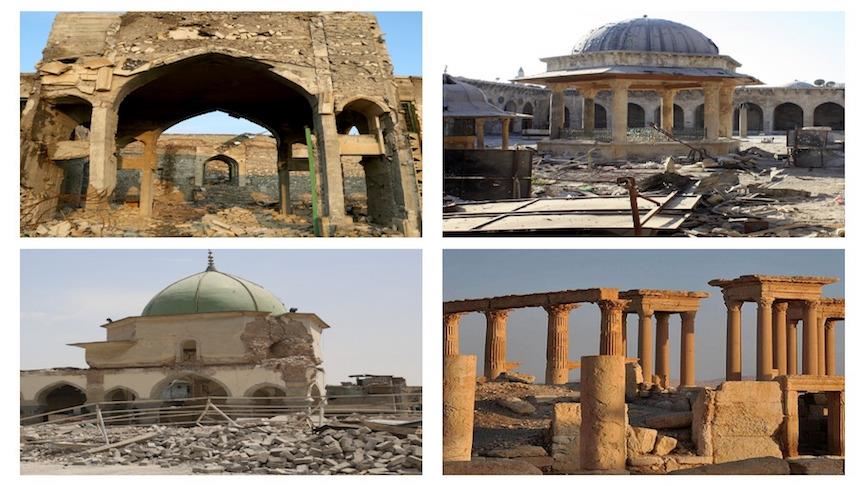ID :
529674
Thu, 04/18/2019 - 16:32
Auther :
Shortlink :
https://oananews.org//node/529674
The shortlink copeid
Notre Dame evokes humanity's other losses in Mideast

ANKARA
Monday’s blaze at Paris’ Notre Dame Cathedral brings to mind other historic landmarks and treasures humanity has lost in recent years during civil wars in Syria, Iraq, and Afghanistan.
While Notre Dame’s roof and steeple fell victim to an accidental fire, the landmarks in the Muslim countries were destroyed deliberately by explosives.
Palmyra, Syria
Terrorist group Daesh occupied Palmyra, a UNESCO World Heritage Site, between 2015 and 2017, and destroyed many of its historic monuments.
Daesh demolished Palmyra’s ancient Lion of Al-lat statue as well as several other majestic statues such as the first-century Temple of Baal Shamin, Temple of Bel, and second-century Tower of Elahbel.
An oasis of immense history in the Syrian desert, northeast of the capital Damascus, Palmyra is home to the monumental ruins of an ancient city that was one of the most important cultural centers in the first two centuries of the common era.
Standing at the crossroads of civilizations, Palmyra is expected to reopen to tourists this summer after extensive renovations.
Great Mosque of Aleppo, Syria
The Great Mosque of Aleppo, also known as Jami Halab al-Kabir or the Umayyad Mosque of Aleppo, is the largest and one of the oldest mosques in the war-ravaged Syrian city of Aleppo.
Located in an ancient World Heritage Site, this jewel of Seljuk civilization is believed to be the host site of the remains of the Prophet Zechariah, the father of John the Baptist, figures revered in both Islam and Christianity.
The colossal mosque was first built in the eighth century BC. The current building, however, dates back to the 11th through 14th centuries. The 114-feet-high stone minaret was built in 1090, and was destroyed by the Syrian regime during fighting in the Syrian civil war in 2013. It has been under renovation since 2017.
Mosque of the Prophet Jonah (Nabi Younis), Mosul, Iraq
In June 2014, Daesh also destroyed the 1,300-year-old Mosque of the Prophet Jonah in Mosul, Iraq, which is believed to be the burial place of the Prophet Jonah. It is believed that the Assyrian King Esarhaddon (681-669 BC) also built a palace at the historic site.
Great Mosque of al-Nuri, Mosul, Iraq
Famous for its leaning minaret, which gave the city its nickname "the hunchback," the al-Nuri Mosque was destroyed by Daesh during the 2017 Battle of Mosul. The 850-year-old historical landmark is currently going through extensive renovation.
Buddhas of Bamyan, Kabul, Afghanistan
Built in the sixth century in the Bamyan Valley in Hazarajat, central Afghanistan, 230 kilometers (140 miles) northwest of Kabul, two monumental statues of Gautama Buddha were destroyed in March 2001 by the Taliban.





